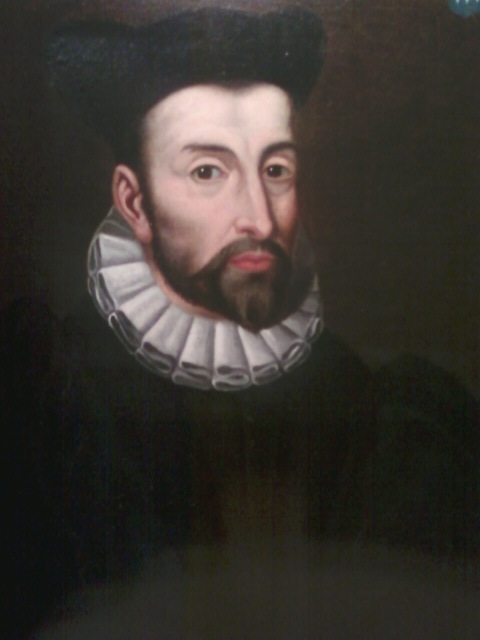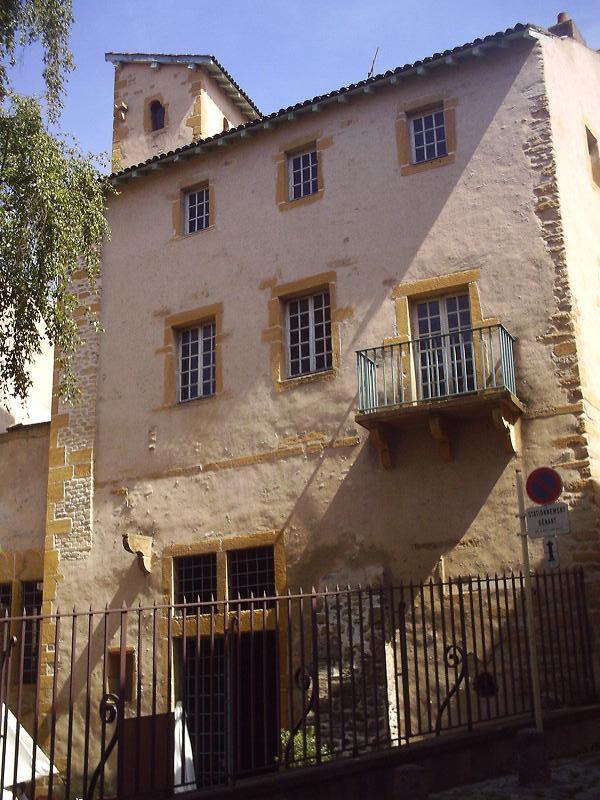|
Fontenay-le-Comte
Fontenay-le-Comte (; Poitevin: ''Funtenaes'' or ''Fintenè'') is a commune and subprefecture in the Vendée department in the Pays de la Loire region of Western France. In 2018, it had a population of 13,302, while its functional area had a population of 41,273.Comparateur de territoire INSEE, retrieved 20 June 2022. Geography The river flows through the town. The town has an area of .History Fontenay was in existence as early as the time of the s. The affix of comte is said to have been applied to it when ...[...More Info...] [...Related Items...] OR: [Wikipedia] [Google] [Baidu] |
Thérèse-Mirza Allix
Thérèse-Mirza Allix, sometimes Mirza Allix, (September 16, 1816 – September 16, 1882) was a French painter of portraits, known for her miniature paintings on enamel, porcelain and earthenware. Along with her sisters, she founded a boarding school for girls in her hometown of Fontenay-le-Comte. Early life and education Thérèse-Mirza Allix was born on September 16, 1816 at Fontenay-le-Comte, Vendée, France to parents Pierre-François Allix and Gabrielle-Thérèse Vexiau. She was the sister of Augustine Allix (born 1823), Jules Allix (born 1818), (born 1836), , and Céline. She studied with Charles de Steuben and Gustave Wappers. Career With her sisters, she ran an institution for young girls in Fontenay-le-Comte from 1842 to 1847. The Allix sisters' boarding school then moved to Paris in 1847. Allix is known for her miniature portraits in porcelain, and enamel. She exhibited her fantasy portraits and copies of portraits by old masters at the Salon de Paris in ... [...More Info...] [...Related Items...] OR: [Wikipedia] [Google] [Baidu] |
Augustine Allix
Augustine Allix (4 May 1823 − 15 January 1901) was a French singer, pianist and teacher of music and song, having been part of the close entourage of the family of Victor Hugo during the latter's exile to Jersey and Guernsey. Life Born in Fontenay-le-Comte on 4 May 1823, Augustine Allix, together with her sisters Thérèse-Mirza, Bathilde, Eudoxie and Céline, ran an institution for young girls in their home town between 1842 and 1847. The Allix sisters' boarding school then moved to Paris in 1847, with Augustine assisting her sister Eudoxie in the direction of the institution's music course. A student of the singer and educator François Delsarte, Allix began a singing career on the Parisian stage that same year. Between 1847 and 1853, she performed several melodies and compositions, including ''La Danse au bois'', a romance composed by Oscar Comettant and written by Adolphe Favre ''Le Lac'' by Louis Niedermeyer, ''La Sympathie'' by , ''Ruth et Booz'', a poem composed by ... [...More Info...] [...Related Items...] OR: [Wikipedia] [Google] [Baidu] |
Mathurin Jacques Brisson
Mathurin Jacques Brisson (; 30 April 1723 – 23 June 1806) was a French zoologist and natural philosopher. Brisson was born at Fontenay-le-Comte. The earlier part of his life was spent in the pursuit of natural history; his published works in this field included ''Le Règne animal'' (1756) and the highly regarded ''Ornithologie'' (1760). As a young man, he was a disciple and assistant of René Antoine Ferchault de Réaumur. For a period of time he was an instructor of physical sciences and natural history to the family of the monarch. He held the chair of physics at the College of Navarre, and from 1759 was a member of the Academy of Sciences. A significant work involving the "specific weight of bodies" was his ''Pesanteur Spécifique des Corps'' (1787). In his investigations of electricity, Brisson was opposed to the theories of Priestley and Franklin. [...More Info...] [...Related Items...] OR: [Wikipedia] [Google] [Baidu] |
Vendée
Vendée (; br, Vande) is a department in the Pays de la Loire region in Western France, on the Atlantic coast. In 2019, it had a population of 685,442.Populations légales 2019: 85 Vendée INSEE Its prefecture is . History The area today called the Vendée was originally known as the ''Bas-Poitou'' and is part of the former province of . In the southeast corner, the village of |
Barnabé Brisson
Barnabé Brisson (Latinised: Barnabas Brissonius) (1531 – 15 November 1591) was a French jurist and politician. Biography Born as the son of the king's lieutenant in Fontenay-le-Comte, Vendée, Brisson studied law in Orléans, Bourges and finally Poitiers, where he stayed on as an advocate. Between 1553 and 1556, he moved on to Paris, where he swiftly gained repute for his learning and rhetorical skills. Charles IX named him Advocate General of the Parlement in 1573. His successor, Henry III, put particular trust in Brisson, who was made first Fiscal in 1573, promoted to Président à mortier in 1580, appointed Sixth President of the Parlement in 1588 and entrusted with several diplomatical missions. As the French Wars of Religion flamed up again, Brisson remained in Paris after the royalist judges on the Parlement fled the city on 16 January 1589, following the King, who had fled on May 13, 1588. Next day, the ''Seize'' ("sixteen"), a group of League notables that now ru ... [...More Info...] [...Related Items...] OR: [Wikipedia] [Google] [Baidu] |
François Rabelais
François Rabelais ( , , ; born between 1483 and 1494; died 1553) was a French Renaissance writer, physician, Renaissance humanist, monk and Greek scholar. He is primarily known as a writer of satire, of the grotesque, and of bawdy jokes and songs. Ecclesiastical yet anticlerical, Christian yet considered by some as a free thinker, a doctor yet having the image of a '' bon vivant'', the multiple facets of his personality sometimes seem contradictory. Caught up in the religious and political turmoil of the Reformation, Rabelais showed himself to be both sensitive and critical towards the great questions of his time. Subsequently, the views of his life and work have evolved according to the times and currents of thought. An admirer of Erasmus, through parody and satire Rabelais fought for tolerance, peace, an evangelical faith, and a return to the knowledge of ancient Greco-Romans to dispel the "Gothic darkness" that characterized the Middle Ages. He took up the theses of P ... [...More Info...] [...Related Items...] OR: [Wikipedia] [Google] [Baidu] |
Poitevin Dialect
Poitevin (''poetevin'') is a dialect of Poitevin-Saintongeais, one of the regional languages of France, spoken in the historical province of Poitou, now administratively divided between Pays de la Loire (Loire countries) and Nouvelle-Aquitaine (New Aquitaine). It is not as commonly spoken as it once was, as the standard form of French now predominates. Poitevin is now classified as one of the ''langues d'oïl'' but is distinguished by certain features adopted from Occitan (''langue d'oc''). The language is spoken on what was the border between the two language families of ''oïl'' and ''oc'' (placenames in the region clearly show historical settlement of ''oc'' speakers). The langue d’oïl subsequently spread south, absorbing ''oc'' features. Poitevin is also widely referred to as ''parlanjhe'' (the language). François Rabelais wrote that he learned this dialect, along with many other languages and dialects, since he was educated in Fontenay-le-Comte. François Villon spok ... [...More Info...] [...Related Items...] OR: [Wikipedia] [Google] [Baidu] |
Vendée (river)
The Vendée (, ; oc, Vendèa) is a river in the Nouvelle-Aquitaine and Pays de la Loire regions in western France. It a right tributary of the Sèvre Niortaise. Its source is near L'Absie, in the west of the Deux-Sèvres department. For a few kilometres, it forms the border between the departments of Vendée (named after the river) and Charente-Maritime, before it flows into the Sèvre Niortaise, near Marans. The name is attested as ''Fluvium Vendre'' in the 10th century, and as ''Flumen Vendee'' and ''Vendeia'' by the 11th century. According to Pierre-Henri Billy, the name ultimately derives from the Celtic toponym ''*vindo-'' meaning white or brilliant in a sacred context (as in the Modern Welsh ''gwyn/wyn''). The name likely originates in Proto-Celtic or Gaulish, but may also have originated in the Gallo or Old Breton languages.Pierre-Henri Billy, ''Dictionnaire des noms de lieux de la France'', éditions Errance, 640 pages, 2011 , . It flows through the following departmen ... [...More Info...] [...Related Items...] OR: [Wikipedia] [Google] [Baidu] |
General Dupont
A general officer is an officer of high rank in the armies, and in some nations' air forces, space forces, and marines or naval infantry. In some usages the term "general officer" refers to a rank above colonel."general, adj. and n.". OED Online. March 2021. Oxford University Press. https://www.oed.com/view/Entry/77489?rskey=dCKrg4&result=1 (accessed May 11, 2021) The term ''general'' is used in two ways: as the generic title for all grades of general officer and as a specific rank. It originates in the 16th century, as a shortening of ''captain general'', which rank was taken from Middle French ''capitaine général''. The adjective ''general'' had been affixed to officer designations since the late medieval period to indicate relative superiority or an extended jurisdiction. Today, the title of ''general'' is known in some countries as a four-star rank. However, different countries use different systems of stars or other insignia for senior ranks. It has a NATO rank sc ... [...More Info...] [...Related Items...] OR: [Wikipedia] [Google] [Baidu] |
Spain
, image_flag = Bandera de España.svg , image_coat = Escudo de España (mazonado).svg , national_motto = ''Plus ultra'' (Latin)(English: "Further Beyond") , national_anthem = (English: "Royal March") , image_map = , map_caption = , image_map2 = , capital = Madrid , coordinates = , largest_city = Madrid , languages_type = Official language , languages = Spanish language, Spanish , ethnic_groups = , ethnic_groups_year = , ethnic_groups_ref = , religion = , religion_ref = , religion_year = 2020 , demonym = , government_type = Unitary state, Unitary Parliamentary system, parliamentary constitutional monarchy , leader_title1 = Monarchy of Spain, Monarch , leader_name1 = Felipe VI , leader_title2 = Prime Minister of Spain ... [...More Info...] [...Related Items...] OR: [Wikipedia] [Google] [Baidu] |
Philology
Philology () is the study of language in oral and writing, written historical sources; it is the intersection of textual criticism, literary criticism, history, and linguistics (with especially strong ties to etymology). Philology is also defined as the study of literary texts as well as oral and written records, the establishment of their authenticity and their original form, and the determination of their meaning. A person who pursues this kind of study is known as a philologist. In older usage, especially British, philology is more general, covering comparative linguistics, comparative and historical linguistics. Classical philology studies classical languages. Classical philology principally originated from the Library of Pergamum and the Library of Alexandria around the fourth century BC, continued by Greeks and Romans throughout the Roman Empire, Roman/Byzantine Empire. It was eventually resumed by European scholars of the Renaissance humanism, Renaissance, where it was s ... [...More Info...] [...Related Items...] OR: [Wikipedia] [Google] [Baidu] |


